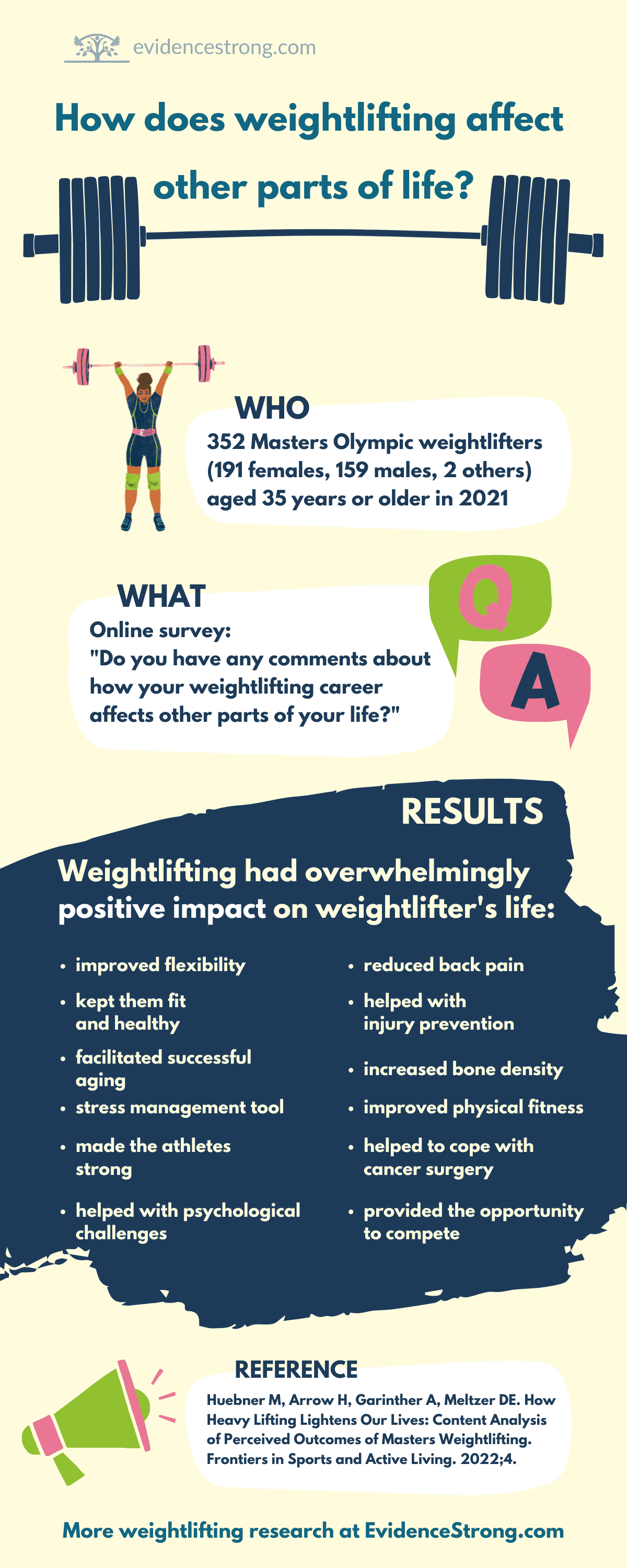Summary of a study investigating how weightlifting affects the lives of Masters Olympic weightlifters.
Who
352 (191 females, 159 males, 2 others) Masters Olympic weightlifters aged 35 years or older in 2021 (Australia, Canada, Germany, Great Britain, Spain, United States).
Design
Online survey (30% response rate) with an open-ended question: “Do you have any comments about how your weightlifting career affects other parts of your life?“.
Outcome measures/tests
- influence of weightlifting on other aspects of life via holistic human rater and computer-tallied analysis (on a full quote and individual word level)
Main results
- 98.1% participated in a weightlifting competition, 80% have a college degree, 56% have attended graduate school, the majority reported an annual income over $100K.
- Comments to the question “Do you have any comments about how your weightlifting career affects other parts of your life?“:
- psychological 42%
- physical health/fitness 30%
- community/family 27%
- goals/meaning to life 26%
- non-work 11% and work commitments 11%
- Majority of comments were positive with only 6.2% of comments being negative (mostly from female athletes in relation to “commitment required”)
- The most used words (across women and men, and across ages) were “competition” and “helps”.
- Across ages words used in comments changed from “work”, “stress” and “mental” in younger athletes to “age” and “years” in older athletes. Women aged 45 to 59 commented more on specific health issues compared to the other age groups (possibly related to perimenopause and menopause). For men only, the words on biological and health impact increased with age.
- Women commented more (51%) on psychological impact than men (31%). Women contributed more negative comments (e.g., “sacrifice”) than men. Some negative words were used to describe positive impact (e.g., “it helps tremendously with stress, anxiety, and depression”). Women used the words like “confidence” and “mental” quite often while men used these infrequently. The prominent word for men was “masters”. Men emphasized “physically” and “sport”, whereas women emphasized “love” and “stress”.
- Personal impact was strongly related to physical fitness and health. Weightlifting made the athletes strong, more flexible, kept them fit and healthy, reduced back pain, increased bone density or help to cope with cancer surgery.
Take home message
Original article
Huebner M, Arrow H, Garinther A, Meltzer DE. How Heavy Lifting Lightens Our Lives: Content Analysis of Perceived Outcomes of Masters Weightlifting. Frontiers in Sports and Active Living. 2022;4.
You might want to read next
How did pandemic affect Olympic weightlifters?
What happens during 10 years of Olympic weightlifting? (in women)
How oral contraceptives influence strength performance and health
